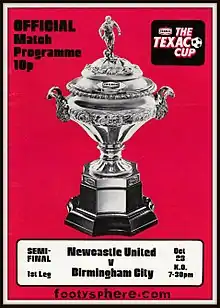Texaco Cup
The Texaco Cup, (the sponsored name of the International League Board Competition), was an association football competition involving sides from England, Scotland and Ireland[1] that had not qualified for European competitions.[2]
| Texaco Cup | |
|---|---|
| Genre | sporting event |
| Frequency | annual |
| Inaugurated | 1970 |
| Most recent | 1975 |

It was one of the first football competitions to receive sponsorship, taking the name of American petroleum company Texaco for £100,000, and was instituted to help promote Texaco's recent purchase of the Regent filling station chain.[3] Irish and Northern Irish clubs withdrew from the competition after 1971–72 due to political pressure,[4] competing in a separate Texaco (All-Ireland) Cup in 1973–74 and 1974–75.[5]
Crowds in the competition fell after the first few seasons,[6] and it became the Anglo-Scottish Cup from 1975–76 after Texaco's sponsorship ended.[7]
Format
For the first four seasons it was played as a straight knockout tournament, with sixteen clubs entered, all ties being two-legged. For the final season of the competition, 16 English clubs played in groups before being joined in the knockout stages by four Scottish sides.[8]
List of Finals
Source:[9]
| Season | Winners | Runners-up | Aggregate score |
|---|---|---|---|
| 1970–71 | Wolverhampton Wanderers | Heart of Midlothian | 3–2 |
| 1971–72 | Derby County | Airdrieonians | 2–1 |
| 1972–73 | Ipswich Town | Norwich City | 4–2 |
| 1973–74 | Newcastle United | Burnley | 2–1 |
| 1974–75 | Newcastle United | Southampton | 3–1 |
NB Finals played over two legs except in 1973–74
Participants
1970–71
![]() Burnley, Nottingham Forest, Stoke City, Tottenham Hotspur, West Bromwich Albion, Wolverhampton Wanderers
Burnley, Nottingham Forest, Stoke City, Tottenham Hotspur, West Bromwich Albion, Wolverhampton Wanderers
![]() Airdrieonians, Dunfermline Athletic, Dundee, Hearts, Morton, Motherwell
Airdrieonians, Dunfermline Athletic, Dundee, Hearts, Morton, Motherwell
![]() Ards, Derry City
Ards, Derry City
![]() Limerick, Shamrock Rovers
Limerick, Shamrock Rovers
1971–72
![]() Coventry City, Derby County, Huddersfield Town, Manchester City, Newcastle United, Stoke City
Coventry City, Derby County, Huddersfield Town, Manchester City, Newcastle United, Stoke City
![]() Airdrieonians, Dundee United, Falkirk, Hearts, Morton, Motherwell
Airdrieonians, Dundee United, Falkirk, Hearts, Morton, Motherwell
![]() Ballymena United, Coleraine
Ballymena United, Coleraine
![]() Shamrock Rovers, Waterford
Shamrock Rovers, Waterford
1972–73
![]() Coventry City, Crystal Palace, Ipswich Town, Leicester City, Newcastle United, Norwich City, Sheffield United, West Bromwich Albion, Wolverhampton Wanderers
Coventry City, Crystal Palace, Ipswich Town, Leicester City, Newcastle United, Norwich City, Sheffield United, West Bromwich Albion, Wolverhampton Wanderers
![]() Ayr United, Dundee, Dundee United, Hearts, Kilmarnock, Motherwell, St Johnstone
Ayr United, Dundee, Dundee United, Hearts, Kilmarnock, Motherwell, St Johnstone
1973–74
![]() Birmingham City, Burnley, Coventry City, Everton, Leicester City, Newcastle United, Norwich City, Sheffield United, Stoke City
Birmingham City, Burnley, Coventry City, Everton, Leicester City, Newcastle United, Norwich City, Sheffield United, Stoke City
![]() Ayr United, Dundee United, East Fife, Hearts, Morton, Motherwell, St Johnstone
Ayr United, Dundee United, East Fife, Hearts, Morton, Motherwell, St Johnstone
1974–75
![]() Birmingham City, Blackpool, Carlisle United, Leyton Orient, Luton Town, Manchester City, Middlesbrough, Newcastle United, Norwich City, Oldham Athletic, Peterborough United, Sheffield United, Southampton, Sunderland, West Bromwich Albion, West Ham United
Birmingham City, Blackpool, Carlisle United, Leyton Orient, Luton Town, Manchester City, Middlesbrough, Newcastle United, Norwich City, Oldham Athletic, Peterborough United, Sheffield United, Southampton, Sunderland, West Bromwich Albion, West Ham United
![]() Aberdeen, Ayr United, Hearts, Rangers
Aberdeen, Ayr United, Hearts, Rangers
References
- "Texaco Cup". Scottish Football Historical Archive. Archived from the original on 4 October 2017. Retrieved 2 January 2019.
- James Ross (20 December 2007). "Texaco Cup & Anglo-Scottish Cup 1971–81". Rec.Sport.Soccer Statistics Foundation. Archived from the original on 21 September 2017. Retrieved 2 January 2019.
- Jim Heath (July 2001). "Best of British oils". When Saturday Comes. Retrieved 17 September 2010.
- Withdrawal of Irish clubs
- All-Ireland Cross-Border Cup Competitions, (C) Copyright Sean DeLoughry, Julian Canny and RSSSF 2003/08
- Scott Murray (26 June 2009). "The Joy of Six: Extinct football competitions". The Guardian. Archived from the original on 3 March 2017. Retrieved 2 January 2019.
- "Anglo-Scottish Cup: Intro". Scottish Football Historical Archive. Archived from the original on 4 October 2017. Retrieved 2 January 2019.
- Tom Lewis (20 December 2007). "Anglo-Scottish Cup & Texaco Cup – Full Results". RSSSF. Retrieved 11 March 2018.
- James M. Ross (20 December 2007). "Texaco Cup Finals 1971–75". Texaco Cup & Anglo-Scottish Cup 1971–81. RSSSF. Retrieved 22 February 2017.
